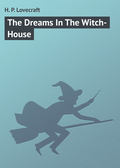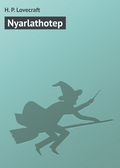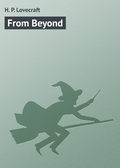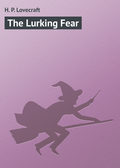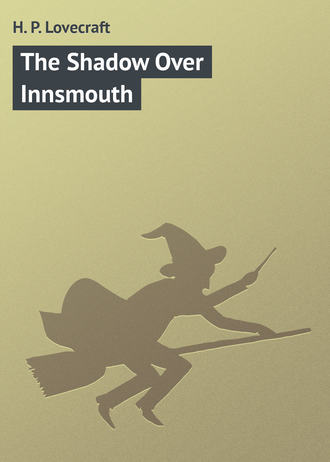
Говард Филлипс Лавкрафт
The Shadow Over Innsmouth
Sheer fortunate chance gave me my reprieve – for the connecting door before me was not only unlocked but actually ajar. In a second I was though, and had my right knee and shoulder against a hall door which was visibly opening inward. My pressure took the opener off guard, for the thing shut as I pushed, so that I could slip the well-conditioned bolt as I had done with the other door. As I gained this respite I heard the battering at the two other doors abate, while a confused clatter came from the connecting door I had shielded with the bedstead. Evidently the bulk of my assailants had entered the southerly room and were massing in a lateral attack. But at the same moment a pass-key sounded in the next door to the north, and I knew that a nearer peril was at hand.
The northward connecting door was wide open, but there was no time to think about checking the already turning lock in the hall. All I could do was to shut and bolt the open connecting door, as well as its mate on the opposite side – pushing a bedstead against the one and a bureau against the other, and moving a washstand in front of the hall door. I must, I saw, trust to such makeshift barriers to shield me till I could get out the window and on the roof of the Paine Street block. But even in this acute moment my chief horror was something apart from the immediate weakness of my defenses. I was shuddering because not one of my pursuers, despite some hideous panting, grunting, and subdued barkings at odd intervals, was uttering an unmuffled or intelligible vocal sound.
As I moved the furniture and rushed toward the windows I heard a frightful scurrying along the corridor toward the room north of me, and perceived that the southward battering had ceased. Plainly, most of my opponents were about to concentrate against the feeble connecting door which they knew must open directly on me. Outside, the moon played on the ridgepole of the block below, and I saw that the jump would be desperately hazardous because of the steep surface on which I must land.
Surveying the conditions, I chose the more southerly of the two windows as my avenue of escape; planning to land on the inner slope of the roof and make for the nearest sky-light. Once inside one of the decrepit brick structures I would have to reckon with pursuit; but I hoped to descend and dodge in and out of yawning doorways along the shadowed courtyard, eventually getting to Washington Street and slipping out of town toward the south.
The clatter at the northerly connecting door was now terrific, and I saw that the weak panelling was beginning to splinter. Obviously, the besiegers had brought some ponderous object into play as a battering-ram. The bedstead, however, still held firm; so that I had at least a faint chance of making good my escape. As I opened the window I noticed that it was flanked by heavy velour draperies suspended from a pole by brass rings, and also that there was a large projecting catch for the shutters on the exterior. Seeing a possible means of avoiding the dangerous jump, I yanked at the hangings and brought them down, pole and all; then quickly hooking two of the rings in the shutter catch and flinging the drapery outside. The heavy folds reached fully to the abutting roof, and I saw that the rings and catch would be likely to bear my weight. So, climbing out of the window and down the improvised rope ladder, I left behind me forever the morbid and horror-infested fabric of the Gilman House.
I landed safely on the loose slates of the steep roof, and succeeded in gaining the gaping black skylight without a slip. Glancing up at the window I had left, I observed it was still dark, though far across the crumbling chimneys to the north I could see lights ominously blazing in the Order of Dagon Hall, the Baptist church, and the Congregational church which I recalled so shiveringly. There had seemed to be no one in the courtyard below, and I hoped there would be a chance to get away before the spreading of a general alarm. Flashing my pocket lamp into the skylight, I saw that there were no steps down. The distance was slight, however, so I clambered over the brink and dropped; striking a dusty floor littered with crumbling boxes and barrels.
The place was ghoulish-looking, but I was past minding such impressions and made at once for the staircase revealed by my flashlight – after a hasty glance at my watch, which shewed the hour to be 2 a.m. The steps creaked, but seemed tolerably sound; and I raced down past a barn-like second story to the ground floor. The desolation was complete, and only echoes answered my footfalls. At length I reached the lower hall at the end of which I saw a faint luminous rectangle marking the ruined Paine Street doorway. Heading the other way, I found the back door also open; and darted out and down five stone steps to the grass-grown cobblestones of the courtyard.
The moonbeams did not reach down here, but I could just see my way about without using the flashlight. Some of the windows on the Gilman House side were faintly glowing, and I thought I heard confused sounds within. Walking softly over to the Washington Street side I perceived several open doorways, and chose the nearest as my route out. The hallway inside was black, and when I reached the opposite end I saw that the street door was wedged immovably shut. Resolved to try another building, I groped my way back toward the courtyard, but stopped short when close to the doorway.
For out of an opened door in the Gilman House a large crowd of doubtful shapes was pouring – lanterns bobbing in the darkness, and horrible croaking voices exchanging low cries in what was certainly not English. The figures moved uncertainly, and I realized to my relief that they did not know where I had gone; but for all that they sent a shiver of horror through my frame. Their features were indistinguishable, but their crouching, shambling gait was abominably repellent. And worst of all, I perceived that one figure was strangely robed, and unmistakably surmounted by a tall tiara of a design altogether too familiar. As the figures spread throughout the courtyard, I felt my fears increase. Suppose I could find no egress from this building on the street side? The fishy odour was detestable, and I wondered I could stand it without fainting. Again groping toward the street, I opened a door off the hall and came upon an empty room with closely shuttered but sashless windows. Fumbling in the rays of my flashlight, I found I could open the shutters; and in another moment had climbed outside and was fully closing the aperture in its original manner.
I was now in Washington Street, and for the moment saw no living thing nor any light save that of the moon. From several directions in the distance, however, I could hear the sound of hoarse voices, of footsteps, and of a curious kind of pattering which did not sound quite like footsteps. Plainly I had no time to lose. The points of the compass were clear to me, and I was glad that all the street lights were turned off, as is often the custom on strongly moonlit nights in prosperous rural regions. Some of the sounds came from the south, yet I retained my design of escaping in that direction. There would, I knew, be plenty of deserted doorways to shelter me in case I met any person or group who looked like pursuers.
I walked rapidly, softly, and close to the ruined houses. While hatless and dishevelled after my arduous climb, I did not look especially noticeable; and stood a good chance of passing unheeded if forced to encounter any casual wayfarer.
At Bates Street I drew into a yawning vestibule while two shambling figures crossed in front of me, but was soon on my way again and approaching the open space where Eliot Street obliquely crosses Washington at the intersection of South. Though I had never seen this space, it had looked dangerous to me on the grocery youth’s map; since the moonlight would have free play there. There was no use trying to evade it, for any alternative course would involve detours of possibly disastrous visibility and delaying effect. The only thing to do was to cross it boldly and openly; imitating the typical shamble of the Innsmouth folk as best I could, and trusting that no one – or at least no pursuer of mine – would be there.
Just how fully the pursuit was organised – and indeed, just what its purpose might be – I could form no idea. There seemed to be unusual activity in the town, but I judged that the news of my escape from the Gilman had not yet spread. I would, of course, soon have to shift from Washington to some other southward street; for that party from the hotel would doubtless be after me. I must have left dust prints in that last old building, revealing how I had gained the street.
The open space was, as I had expected, strongly moonlit; and I saw the remains of a parklike, iron-railed green in its center. Fortunately no one was about though a curious sort of buzz or roar seemed to be increasing in the direction of Town Square. South Street was very wide, leading directly down a slight declivity to the waterfront and commanding a long view out to sea; and I hoped that no one would be glancing up it from afar as I crossed in the bright moonlight.
My progress was unimpeded, and no fresh sound arose to hint that I had been spied. Glancing about me, I involuntarily let my pace slacken for a second to take in the sight of the sea, gorgeous in the burning moonlight at the street’s end. Far out beyond the breakwater was the dim, dark line of Devil Reef, and as I glimpsed it I could not help thinking of all the hideous legends I had heard in the last twenty-four hours – legends which portrayed this ragged rock as a veritable gateway to realms of unfathomed horror and inconceivable abnormality.
Then, without warning, I saw the intermittent flashes of light on the distant reef. They were definite and unmistakable, and awaked in my mind a blind horror beyond all rational proportion. My muscles tightened for panic flight, held in only by a certain unconscious caution and half-hypnotic fascination. And to make matters worse, there now flashed forth from the lofty cupola of the Gilman House, which loomed up to the northeast behind me, a series of analogous though differently spaced gleams which could be nothing less than an answering signal.
Controlling my muscles, and realising afresh – how plainly visible I was, I resumed my brisker and feignedly shambling pace; though keeping my eyes on that hellish and ominous reef as long as the opening of South Street gave me a seaward view. What the whole proceeding meant, I could not imagine; unless it involved some strange rite connected with Devil Reef, or unless some party had landed from a ship on that sinister rock. I now bent to the left around the ruinous green; still gazing toward the ocean as it blazed in the spectral summer moonlight, and watching the cryptical flashing of those nameless, unexplainable beacons.
It was then that the most horrible impression of all was borne in upon me – the impression which destroyed my last vestige of self-control and sent me running frantically southward past the yawning black doorways and fishily staring windows of that deserted nightmare street. For at a closer glance I saw that the moonlit waters between the reef and the shore were far from empty. They were alive with a teeming horde of shapes swimming inward toward the town; and even at my vast distance and in my single moment of perception I could tell that the bobbing heads and flailing arms were alien and aberrant in a way scarcely to be expressed or consciously formulated.
My frantic running ceased before I had covered a block, for at my left I began to hear something like the hue and cry of organised pursuit. There were footsteps and guttural sounds, and a rattling motor wheezed south along Federal Street. In a second all my plans were utterly changed – for if the southward highway were blocked ahead of me, I must clearly find another egress from Innsmouth. I paused and drew into a gaping doorway, reflecting how lucky I was to have left the moonlit open space before these pursuers came down the parallel street.
A second reflection was less comforting. Since the pursuit was down another street, it was plain that the party was not following me directly. It had not seen me, but was simply obeying a general plan of cutting off my escape. This, however, implied that all roads leading out of Innsmouth were similarly patrolled; for the people could not have known what route I intended to take. If this were so, I would have to make my retreat across country away from any road; but how could I do that in view of the marshy and creek-riddled nature of all the surrounding region? For a moment my brain reeled – both from sheer hopelessness and from a rapid increase in the omnipresent fishy odour.
Then I thought of the abandoned railway to Rowley, whose solid line of ballasted, weed-grown earth still stretched off to the northwest from the crumbling station on the edge at the river-gorge. There was just a chance that the townsfolk would not think of that; since its briar-choked desertion made it half-impassable, and the unlikeliest of all avenues for a fugitive to choose. I had seen it clearly from my hotel window and knew about how it lay. Most of its earlier length was uncomfortably visible from the Rowley road, and from high places in the town itself; but one could perhaps crawl inconspicuously through the undergrowth. At any rate, it would form my only chance of deliverance, and there was nothing to do but try it.
Drawing inside the hall of my deserted shelter, I once more consulted the grocery boy’s map with the aid of the flashlight. The immediate problem was how to reach the ancient railway; and I now saw that the safest course was ahead to Babson Street; then west to Lafayette – there edging around but not crossing an open space homologous to the one I had traversed – and subsequently back northward and westward in a zigzagging line through Lafayette, Bates, Adam, and Bank streets – the latter skirting the river gorge – to the abandoned and dilapidated station I had seen from my window. My reason for going ahead to Babson was that I wished neither to recross the earlier open space nor to begin my westward course along a cross street as broad as South.
Starting once more, I crossed the street to the right-hand side in order to edge around into Babson as inconspicuously as possible. Noises still continued in Federal Street, and as I glanced behind me I thought I saw a gleam of light near the building through which I had escaped. Anxious to leave Washington Street, I broke into a quiet dogtrot, trusting to luck not to encounter any observing eye. Next the corner of Babson Street I saw to my alarm that one of the houses was still inhabited, as attested by curtains at the window; but there were no lights within, and I passed it without disaster.
In Babson Street, which crossed Federal and might thus reveal me to the searchers, I clung as closely as possible to the sagging, uneven buildings; twice pausing in a doorway as the noises behind me momentarily increased. The open space ahead shone wide and desolate under the moon, but my route would not force me to cross it. During my second pause I began to detect a fresh distribution of vague sounds; and upon looking cautiously out from cover beheld a motor car darting across the open space, bound outward along Eliot Street, which there intersects both Babson and Lafayette.
As I watched – choked by a sudden rise in the fishy odour after a short abatement – I saw a band of uncouth, crouching shapes loping and shambling in the same direction; and knew that this must be the party guarding the Ipswich road, since that highway forms an extension of Eliot Street. Two of the figures I glimpsed were in voluminous robes, and one wore a peaked diadem which glistened whitely in the moonlight. The gait of this figure was so odd that it sent a chill through me – for it seemed to me the creature was almost hopping.
When the last of the band was out of sight I resumed my progress; darting around the corner into Lafayette Street, and crossing Eliot very hurriedly lest stragglers of the party be still advancing along that thoroughfare. I did hear some croaking and clattering sounds far off toward Town Square, but accomplished the passage without disaster. My greatest dread was in re-crossing broad and moonlit South Street – with its seaward view – and I had to nerve myself for the ordeal. Someone might easily be looking, and possible Eliot Street stragglers could not fail to glimpse me from either of two points. At the last moment I decided I had better slacken my trot and make the crossing as before in the shambling gait of an average Innsmouth native.
When the view of the water again opened out – this time on my right – I was half-determined not to look at it at all. I could not however, resist; but cast a sidelong glance as I carefully and imitatively shambled toward the protecting shadows ahead. There was no ship visible, as I had half-expected there would be. Instead, the first thing which caught my eye was a small rowboat pulling in toward the abandoned wharves and laden with some bulky, tarpaulin-covered object. Its rowers, though distantly and indistinctly seen, were of an especially repellent aspect. Several swimmers were still discernible; while on the far black reef I could see a faint, steady glow unlike the winking beacon visible before, and of a curious colour which I could not precisely identify. Above the slant roofs ahead and to the right there loomed the tall cupola of the Gilman House, but it was completely dark. The fishy odour, dispelled for a moment by some merciful breeze, now closed in again with maddening intensity.
I had not quite crossed the street when I heard a muttering band advancing along Washington from the north. As they reached the broad open space where I had had my first disquieting glimpse of the moonlit water I could see them plainly only a block away – and was horrified by the bestial abnormality of their faces and the dog-like sub-humanness of their crouching gait. One man moved in a positively simian way, with long arms frequently touching the ground; while another figure – robed and tiaraed – seemed to progress in an almost hopping fashion. I judged this party to be the one I had seen in the Gilman’s courtyard – the one, therefore, most closely on my trail. As some of the figures turned to look in my direction I was transfixed with fright, yet managed to preserve the casual, shambling gait I had assumed. To this day I do not know whether they saw me or not. If they did, my stratagem must have deceived them, for they passed on across the moonlit space without varying their course – meanwhile croaking and jabbering in some hateful guttural patois I could not identify.
Once more in shadow, I resumed my former dog-trot past the leaning and decrepit houses that stared blankly into the night. Having crossed to the western sidewalk I rounded the nearest corner into Bates Street where I kept close to the buildings on the southern side. I passed two houses shewing signs of habitation, one of which had faint lights in upper rooms, yet met with no obstacle. As I turned into Adams Street I felt measurably safer, but received a shook when a man reeled out of a black doorway directly in front of me. He proved, however, too hopelessly drunk to be a menace; so that I reached the dismal ruins of the Bank Street warehouses in safety.
No one was stirring in that dead street beside the river-gorge, and the roar of the waterfalls quite drowned my foot steps. It was a long dog-trot to the ruined station, and the great brick warehouse walls around me seemed somehow more terrifying than the fronts of private houses. At last I saw the ancient arcaded station – or what was left of it – and made directly for the tracks that started from its farther end.
The rails were rusty but mainly intact, and not more than half the ties had rotted away. Walking or running on such a surface was very difficult; but I did my best, and on the whole made very fair time. For some distance the line kept on along the gorge’s brink, but at length I reached the long covered bridge where it crossed the chasm at a dizzying height. The condition of this bridge would determine my next step. If humanly possible, I would use it; if not, I would have to risk more street wandering and take the nearest intact highway bridge.
The vast, barnlike length of the old bridge gleamed spectrally in the moonlight, and I saw that the ties were safe for at least a few feet within. Entering, I began to use my flashlight, and was almost knocked down by the cloud of bats that flapped past me. About half-way across there was a perilous gap in the ties which I feared for a moment would halt me; but in the end I risked a desperate jump which fortunately succeeded.
I was glad to see the moonlight again when I emerged from that macabre tunnel. The old tracks crossed River Street at grade, and at once veered off into a region increasingly rural and with less and less of Innsmouth’s abhorrent fishy odour. Here the dense growth of weeds and briers hindered me and cruelly tore at my clothes, but I was none the less glad that they were there to give me concealment in case of peril. I knew that much of my route must be visible from the Rowley road.
The marshy region began very abruptly, with the single track on a low, grassy embankment where the weedy growth was somewhat thinner. Then came a sort of island of higher ground, where the line passed through a shallow open cut choked with bushes and brambles. I was very glad of this partial shelter, since at this point the Rowley road was uncomfortably near according to my window view. At the end of the cut it would cross the track and swerve off to a safer distance; but meanwhile I must be exceedingly careful. I was by this time thankfully certain that the railway itself was not patrolled.
Just before entering the cut I glanced behind me, but saw no pursuer. The ancient spires and roofs of decaying Innsmouth gleamed lovely and ethereal in the magic yellow moonlight, and I thought of how they must have looked in the old days before the shadow fell. Then, as my gaze circled inland from the town, something less tranquil arrested my notice and held me immobile for a second.
What I saw – or fancied I saw – was a disturbing suggestion of undulant motion far to the south; a suggestion which made me conclude that a very large horde must be pouring out of the city along the level Ipswich road. The distance was great and I could distinguish nothing in detail; but I did not at all like the look of that moving column. It undulated too much, and glistened too brightly in the rays of the now westering moon. There was a suggestion of sound, too, though the wind was blowing the other way – a suggestion of bestial scraping and bellowing even worse than the muttering of the parties I had lately overheard.
All sorts of unpleasant conjectures crossed my mind. I thought of those very extreme Innsmouth types said to be hidden in crumbling, centuried warrens near the waterfront; I thought, too, of those nameless swimmers I had seen. Counting the parties so far glimpsed, as well as those presumably covering other roads, the number of my pursuers must be strangely large for a town as depopulated as Innsmouth.
Whence could come the dense personnel of such a column as I now beheld? Did those ancient, unplumbed warrens teem with a twisted, uncatalogued, and unsuspected life? Or had some unseen ship indeed landed a legion of unknown outsiders on that hellish reef? Who were they? Why were they here? And if such a column of them was scouring the Ipswich road, would the patrols on the other roads be likewise augmented?
I had entered the brush-grown cut and was struggling along at a very slow pace when that damnable fishy odour again waxed dominant. Had the wind suddenly changed eastward, so that it blew in from the sea and over the town? It must have, I concluded, since I now began to hear shocking guttural murmurs from that hitherto silent direction. There was another sound, too – a kind of wholesale, colossal flopping or pattering which somehow called up images of the most detestable sort. It made me think illogically of that unpleasantly undulating column on the far-off Ipswich road.
And then both stench and sounds grew stronger, so that I paused shivering and grateful for the cut’s protection. It was here, I recalled, that the Rowley road drew so close to the old railway before crossing westward and diverging. Something was coming along that road, and I must lie low till its passage and vanishment in the distance. Thank heaven these creatures employed no dogs for tracking – though perhaps that would have been impossible amidst the omnipresent regional odour. Crouched in the bushes of that sandy cleft I felt reasonably safe, even though I knew the searchers would have to cross the track in front of me not much more than a hundred yards away. I would be able to see them, but they could not, except by a malign miracle, see me.
All at once I began dreading to look at them as they passed. I saw the close moonlit space where they would surge by, and had curious thoughts about the irredeemable pollution of that space. They would perhaps be the worst of all Innsmouth types – something one would not care to remember.
The stench waxed overpowering, and the noises swelled to a bestial babel of croaking, baying and barking without the least suggestion of human speech. Were these indeed the voices of my pursuers? Did they have dogs after all? So far I had seen none of the lower animals in Innsmouth. That flopping or pattering was monstrous – I could not look upon the degenerate creatures responsible for it. I would keep my eyes shut till the sound receded toward the west. The horde was very close now – air foul with their hoarse snarlings, and the ground almost shaking with their alien-rhythmed footfalls. My breath nearly ceased to come, and I put every ounce of will-power into the task of holding my eyelids down.
I am not even yet willing to say whether what followed was a hideous actuality or only a nightmare hallucination. The later action of the government, after my frantic appeals, would tend to confirm it as a monstrous truth; but could not an hallucination have been repeated under the quasi-hypnotic spell of that ancient, haunted, and shadowed town? Such places have strange properties, and the legacy of insane legend might well have acted on more than one human imagination amidst those dead, stench-cursed streets and huddles of rotting roofs and crumbling steeples. Is it not possible that the germ of an actual contagious madness lurks in the depths of that shadow over Innsmouth? Who can be sure of reality after hearing things like the tale of old Zadok Allen? The government men never found poor Zadok, and have no conjectures to make as to what became of him. Where does madness leave off and reality begin? Is it possible that even my latest fear is sheer delusion?
But I must try to tell what I thought I saw that night under the mocking yellow moon – saw surging and hopping down the Rowley road in plain sight in front of me as I crouched among the wild brambles of that desolate railway cut. Of course my resolution to keep my eyes shut had failed. It was foredoomed to failure – for who could crouch blindly while a legion of croaking, baying entities of unknown source flopped noisomely past, scarcely more than a hundred yards away?



